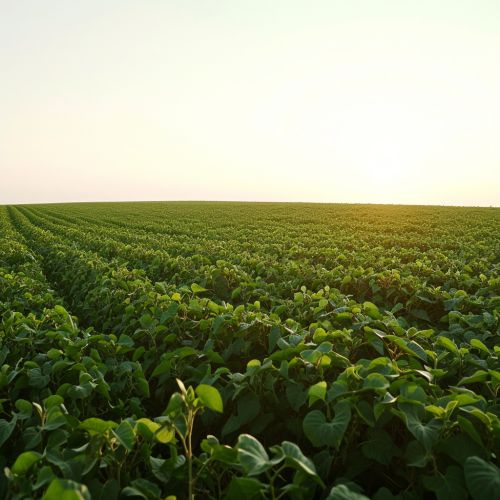Roundup Ready soybeans
Introduction
Roundup Ready soybeans are a type of genetically modified organism (GMO) developed by Monsanto, a multinational agrochemical and agricultural biotechnology corporation. These soybeans have been genetically engineered to be resistant to glyphosate, the active ingredient in Monsanto's herbicide Roundup. This allows farmers to spray Roundup on their fields to kill weeds without harming the soybeans.

Development and Approval
The development of Roundup Ready soybeans began in the 1980s, with the goal of creating a soybean plant that could withstand applications of glyphosate. The key to this resistance lies in a gene from the bacterium Agrobacterium, which produces an enzyme that is not affected by glyphosate. This gene was inserted into the soybean plant using a method known as genetic transformation.
In 1994, the US Department of Agriculture (USDA) and the FDA approved Roundup Ready soybeans for commercial use. The approval process involved extensive testing to ensure that the modified soybeans were safe for human consumption and would not have a detrimental impact on the environment.
Usage and Impact
Since their introduction, Roundup Ready soybeans have been widely adopted by farmers in the United States and other countries. In 2016, over 90% of soybeans planted in the United States were Roundup Ready. The use of these soybeans has significantly changed farming practices, allowing for more efficient weed control and potentially increasing yields.
However, the widespread use of Roundup Ready soybeans has also raised concerns. Some studies have suggested that the use of glyphosate can lead to the development of herbicide-resistant weeds. Additionally, there have been debates about the safety of consuming GMOs, although scientific consensus maintains that GMOs are safe to eat.
Controversies and Legal Issues
Monsanto's patent on the original Roundup Ready soybeans expired in 2014, leading to legal disputes over the use of the technology. The company has also faced criticism for its business practices, including the enforcement of its patents and the impact of its products on biodiversity.
In addition, there have been numerous lawsuits against Monsanto related to the health effects of glyphosate. In 2015, the International Agency for Research on Cancer (IARC) classified glyphosate as "probably carcinogenic to humans," although other regulatory bodies have disputed this classification.
Future Developments
Despite the controversies, Roundup Ready soybeans continue to be a major part of the global agricultural landscape. Monsanto has developed a second generation of Roundup Ready soybeans, known as Roundup Ready 2 Yield, which are designed to produce higher yields than the original variety. The company is also working on new technologies, such as soybeans that are resistant to multiple herbicides.
